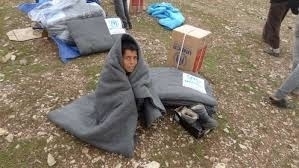Since the beginning of the political movement in Syria and even before the start of the mass displacement, thousands of Syrians have left their country to escape the oppression of the regime and the persecution against activists. While many of these activists were not wanted by the security forces, they chose to be on the safe side and left.
Some of those who left believed that the toppling of the government would happen in a matter of days or weeks. Those who were more pessimistic expected it to take a year at most, allowing them to return home to a hero’s welcome. That, however, did not happen, and their exile has persisted. They are now facing a new tragedy. Those who left no longer have the choice to return, and they are no longer able to meet their daily living needs in their host countries.
Wanderers in Neighboring Countries
It is easy to distinguish groups of Syrians living in Beirut, Amman, and Istanbul. They wander and lounge around public squares, bars, and cafes. A few of them still play a role in the revolution but with the exception of subtle theorizing and political analysis, the time they spend in exile is being wasted.
Jamal, 29, left Syria and went to Amman in September 2012, leaving behind a family of five headed by his father, who earns a modest income. Jamal’s father explains, “We were worried that he would be arrested because of his support for the revolution. So when he left, we were relieved. But we soon realized the trouble that leaving created for him. He was unable to secure a job, and I was forced to help him financially so he could survive. This was on top of my financial obligations here. He is now trying to get asylum in one of the European countries, and he might succeed. However, if he doesn’t, he won’t be able to return to Syria as long as the crisis continues, which has happened to a lot of youth who rushed to make the decision to stay away.”
Clearly, waves of people continue to leave Syria, despite being treated differently than they used to be. The perception towards them [in neighboring countries] has changed following the outbreak of the crisis. Months ago during the growing talk of a military strike, thousands of Syrians heading to Lebanon were mistreated and humiliated. Members of the Lebanese police force treated them not as humans, but as cattle crossing the border in need of discipline with sticks and whips. This was payback in the minds of some Lebanese who experienced similar treatment during the presence of the Syrian military in Lebanon.
Obsession with Emmigration
With every day that passes, Syrians lose hope for a speedy resolution to the crisis that has been escalating for 30 months. Millions of them have hit rock bottom, experiencing violence, death and displacement. Despair has even begun to creep into the souls of those who have tried reluctantly to adapt to the crisis, and it is rare nowadays to find a Syrian family that isn’t considering leaving the country.
Ayham, a shopkeeper who applied for asylum at the UNHCR in Beirut, says that he has an interview in two months. He hopes that he and his family will be able to leave, since staying in Syria is beyond dangerous. Even if the situation were to stabilize in the short term, it will not be safe in the long term, which is reminiscent of the situation in Iraq. The Iraqis are scattered all over the world as a result of their plight after a decade of war.
After over two-and-a-half years of suffering and loss, the situation in Syrian offers little hope or reason for optimism. The current circumstances offer legal justifications for anyone who knocks on the doors of embassies and the UNHCR looking to escape the crisis. Few are the ones who continue to stay in Syria on purely moral grounds.
......


